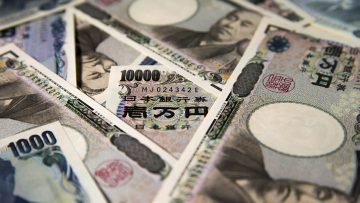
Global economic indicators as of 2019 may be pointing toward a recession. Falling stocks, trade wars that pit the United States against rivals like China, and an inverted yield curve at the Treasury may be predicting a recession. Global economic health may be headed downward, and smart investors will need to make strong decisions in order to stay afloat in the challenging economy.
The current United States administration, while bullish on business in general, may cause economic woes with its current policies of instigating trade wars. These trade wars will lead to higher consumer prices, causing drops in spending just in time for the crucial holiday season. Consumer confidence may continue to drop, with citizens more interested in protecting their money than investing it back into the economy.
Isaac Gilinski, economic forecaster and owner of Brickell Analytics and the Rising Yield Deflation® trademark, explains how the next global recession could give Japan a stronger foothold in the world economy and lead toward greater gains in productivity and trade.
Growth Forecasts for Japan
While Japan is subject to difficulties stemming from other countries’ economies and trade wars, they may also have internal problems which could affect growth in the short term. The Japanese government plans to raise the national sales tax, which could have the effect of depressing retail sales in the short term.
The Bank of Japan has been maintaining an easy monetary policy with the goal of boosting inflation. The target is 2 percent. This policy has not been very successful. The “breakeven” rate, a measure of investor expectations, has dropped to 0.2 percent, meaning that investors in Japan expect no further inflation in the next few years. This means that the yen should be able to rise as inflation stays low. This could cause Japan to recover quickly from any possible economic downturn.
Japan and Economic Growth
When the next recession has been remedied, Japan may come out ahead as an engine of economic growth. While Japan’s economy has struggled in recent years, the next recession may present an opportunity for Japan to become an economic powerhouse, once again.
The US dollar is on a path to rise in the next few years, which is a deceptive indicator of a recession to come. When the US dollar rises, the Japanese yen may rise as well. The strength of these two currencies could help to offset some of the problems that could arise from a recession, but their rise may see the downfall of other economies and less valuable currencies.
The Japanese yen may rise as the dollar falls. The USD-JPY may decline to 80, revisiting the October 2011 all-time low, during the next recession. This will mean that Japan is in a stronger position than its economic rivals, as Japan’s purchasing power increases vis-à-vis the stronger Yen. Japan will be able to make superior choices in its investments, leading to growth and development across all sectors.
Japan may also be in a better position to capitalize on the trade war pressures the U.S. is placing on China. Both Japan and the United States get a great many industrial and technical parts from China, but the uncertain supply chain may mean that Japanese companies bring back the manufacturing to Japan. The auto industry may also be in trouble in the short term, with consumers hanging onto their cars longer rather than trading them in for new ones. However, in the long-run, Japanese companies may prevail.
Japan’s Economic Strength
Despite global recession fears, Japan has a great many factors in its favor. One of these factors is the strength of the Japanese auto industry. When the world recession affects prices and the ability to buy cars around the world, Japanese auto companies may be able to purchase faltering brands and create a stronger growth portfolio for themselves, due to the stronger Yen. This could lead to a consolidation of the global auto market similar to the way in which German car companies purchased American car companies during the 1990s and 2000s. This potential side benefit of a global recession could point to a resurgence in the Japanese economy, creating jobs and reassuring Japan of its place in the global auto market.
Japan also has a well-developed information economy, with a highly-educated workforce and the potential to create many good-paying jobs. Though the Japanese population has stagnated, newly graduated university students are able to take demanding positions and create pockets of economic growth. The world’s economic fundamentals may be shaky at the present time, but future opportunities lie in taking advantage of favorable trade conditions and tariff situations.
Japan’s Economic Fortunes
The fortunes of the island nation of Japan are closely tied to the world economy. If the world economy descends into a predicted recession in 2020, Japanese investors will need to keep these fundamentals in mind in order to take advantage of market conditions for future growth. Isaac Gilinski calls on all interested parties to monitor the global and Japanese economies and judge whether market conditions could point to Japanese investment in the near future.
This is an article provided by our partners network. It does not reflect the views or opinions of our editorial team and management.
Contributed content

Founder Dinis Guarda
IntelligentHQ Your New Business Network.
IntelligentHQ is a Business network and an expert source for finance, capital markets and intelligence for thousands of global business professionals, startups, and companies.
We exist at the point of intersection between technology, social media, finance and innovation.
IntelligentHQ leverages innovation and scale of social digital technology, analytics, news, and distribution to create an unparalleled, full digital medium and social business networks spectrum.
IntelligentHQ is working hard, to become a trusted, and indispensable source of business news and analytics, within financial services and its associated supply chains and ecosystems































